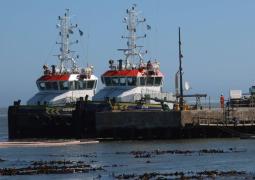
Some residents of Port Nolloth, a small coastal town in the Northern Cape province, have lamented the lack of economic opportunities and development in a town that has very high unemployment while being rich in marine mineral wealth. The residents were giving oral submissions to the Portfolio Committee on Environmental Affairs during the public hearings on the Marine Spatial Planning Bill this week.
When the Committee visited the town this week, it visited the old dilapidated small harbour where several boats can be seen that are used for mining diamonds in the sea. Some residents have blamed these problems to the fact that big mining companies mine the area without contributing economically to the town.
Mr Jeffery David Lourens, a 62-year-old diver and nature conservationist who has lived in Port Nolloth for the past 36 years, bemoaned how Port Nolloth has regressed socially and economically mainly due to the fact that big businesses such as Trans Hex, a big mining company, and Alexcor, a state-owned company, that are involved in deep-sea diamond mining in the town, are not doing so in a way that conserves the biodiversity and crayfish that lives in the waters in that area.
Mr Lourens says he is hoping that the Marine Spatial Planning Bill will outlaw this form of deep-sea mining completely as it is destroying the biodiversity, and due to the fact that most of this activity, particularly from Trans Hex, takes place without the company waiting for an environmental impact assessment.
According to him, these big companies quarry rocks from the inland and come with seven or eight massive trucks in a row and dump the rocks from those trucks into the edge of the shore, and a big excavator puts the rocks into the sea to make a road further and further into the sea up to 200m into the sea and 8m deep to the bottom of the sea.
“They close the whole area off and they come with pumps and pump all the water out and all the fish, crayfish, shells and everything that lives in that area dies immediately. Then they pull in with heavy machinery into the ocean floor, a breeding ground for fish that gets destroyed by the heavy machinery,” he said.
“The places that they earmark to do this are all ancient river mouths where there are a lot of big rocks, boulders and reefs and that is where the kelp (seaweed) grows and it’s the main habitat for the fish. After they have finished mining in that area, they do not remove those walls. That affects the quality of the water and nothing can live in that area as the water becomes super salty and becomes a dead zone (an area in the ocean which is virally devoid of oxygen),” he said.
Some residents who are fishermen, who also made oral submissions on the Bill, also complained that they are not allowed to fish in some areas even though they have received permits from the government, due to the fact that those areas are used for deep-sea mining.
The MEC for Environment and Nature Conservation, Ms Tiny Chotelo, said in the past South Africa’s coastline was not always utilised and managed in an appropriate manner, which is why the country experienced high levels of degradation of significant portions of this valuable national asset. “It was indeed due to this state of affairs that the Integrated Coastal Management Act was developed to promote ecologically, socially and economically sustainable coastal development and resource use along our coastline. We are here this afternoon to pay tribute to our ocean in the form of the Marine Spatial Planning Bill. Perhaps this is just an extension of the already existing honour we have for the oceans,” she said.
The Chairperson of the Committee, Mr Philemon Mapulane, also told the residents of Port Nolloth that this beautiful coastal area has a lot of potential for development. “All areas of government from national, provincial and local level should work together to make sure that there is development in this area,” he said.
Mr Mapulane also informed the public that the Committee has received information that there are plans to develop Port Nolloth as part of Operation Phakisa. “We agree with the people that there is a lot of potential in this area. Although it is not our responsibility, we recognise that this development is necessary in this area so that there could be economic opportunities for the people of this area,” he said.
By Faith Kwaza
16 August 2017

